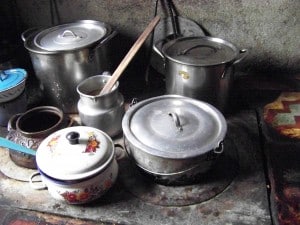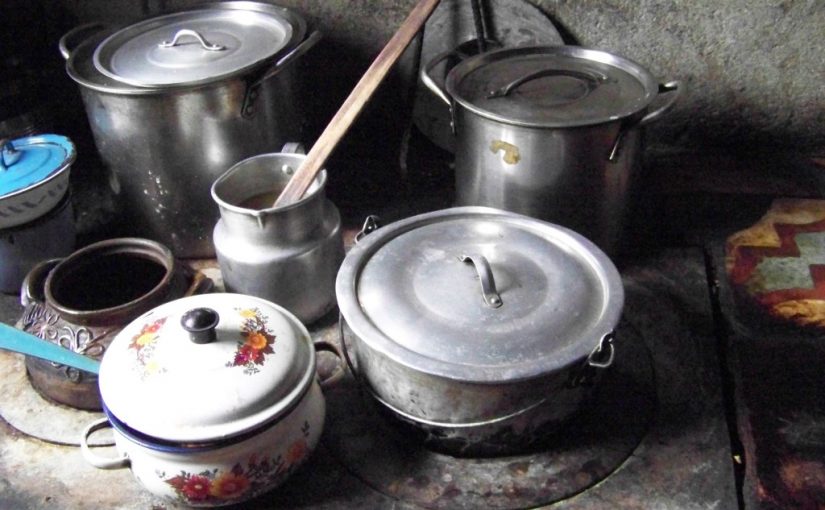
K’iche’ does not have verbs equivalent to English ‘to have’ and ‘to be’, which introduce existential sentences or possession clauses such as “There is maize in the kitchen” or “I have a mean dog.” In K’iche’, as in most Mayan languages, possession and existence are denoted with a special particle called an “existential” (k’o in K’iche’). The existential k’o often appears in sentence or phrase initial position. In sentence-final position it is replaced with k’olik. In this unit you will learn how to use k’o and its use in conversations.
In the following videos, Nan Silveria and Nan Chaya tell us about the objects that are found in the kitchen.
Possession
The particle k’o followed by a possessed noun indicates possession (which in English is expressed with the verb “to have”), as we see in the examples below:
| Ex. 1 K’o nuwuj k’o nu-wuj Ex my-book I have a book. |
Ex.2 K’o nuwa chi’. k’o nu-wa chi’ Ex my-food here I have food here. |
| Ex. 3 K’o uxajab’ ri ak’al. k’o u-xajab’ ri ak’al Ex his-sandals det child The child has sandals. |
Ex. 4 K’o qo’ch chila’ Nawalja’. k’o q-o’ch chila’ Nawalja’ Ex our-house there Nahualá We have a house in Nahualá. |
| Ex. 5 K’o iwab’ix pa juyub’. k’o iw-ab’ix pa juyub’ Ex y’all’s-cornfield loc hill You all have a cornfield in the forest/mountain/hill. |
Ex. 6 E k’o kik’ajol le a’chijab’. e k’o ki-k’ajol le a’chij-ab’ PL ex their-son (of man) det men-PL The men have sons. |
Existential Sentences
The particle k’o also functions as an existential (which in English can be glossed as “There is/There are” or different conjugations of the verb “to be”), as we can see from the examples below:
| Ex. 7 K’o jun ala pa tijob’al. k’o jun ala pa tijob’al Ex one boy loc school There is a boy in the school. |
Ex. 8 K’o jun tz’i’ pa b’e. k’o jun tz’i’ pa b’e Ex one dog loc road There is a dog on the road. |
| Ex. 9 At k’o pa swan! at k’o pa swan You Ex. loc ravine You are in the ravine! |
Ex. 10 Oj k’o pa le ro’ch le a Wel. Oj k’o pa le r-o’ch le a Wel. we Ex. loc. det his-house det Manuel We are at Manuel’s house. |
In the following lesson, we will learn more about how to use the existential particle k’o, and we will also learn about personal pronouns. For now, practice using the possessive and existential phrases we have learned in this lesson.
| ab’ix | cornfield, milpa |
| k’ayib’al | market |
| swan | ravine |
| tz’ib’ab’al | pen, pencil |
| sib’alaj | very, much, a lot |
| b’e | road, path |
| t’uy’ | pot (for cooking) |
| chak | work |
| achi | man |
| achijab’ | men |
| ixoq | woman |
| ixoqib’ | women |
| tijonik | class, lesson |
| rajil | money |
Write three sentences using the possessive k’o and three sentences using the existencial k’o.
Translate the following sentences to K’iche’.
- I have a pen.
- My friends have a house in Nahualá.
- There is a cow on the road.
- My mother has a lot of money.
- There is a lot of work in the lesson.
- We are in the K’iche’ class.
- There is a pot in the kitchen.
- We have a cornfield in the ravine.
- Manuela is at Xwan’s house.
- My dad is at the market.
Answers
- In k’o nutz’ib’ab’al.
- Le e wachi’il k’o k’och pa Nahualja’.
- K’o jun wakax pa le b’e.
- Sib’alaj k’o urajil le nunan.
- K’i le chak pa we tijonik.
- Oj k’o pa le tijonik re K’iche’.
- K’o jun t’u’y pa le nuk’b’al.
- K’o qab’ix pa siwan.
- Al Manuela k’o pa le ro’ch a Xwan.
- Le nutat k’o pa le k’ayib’al.
